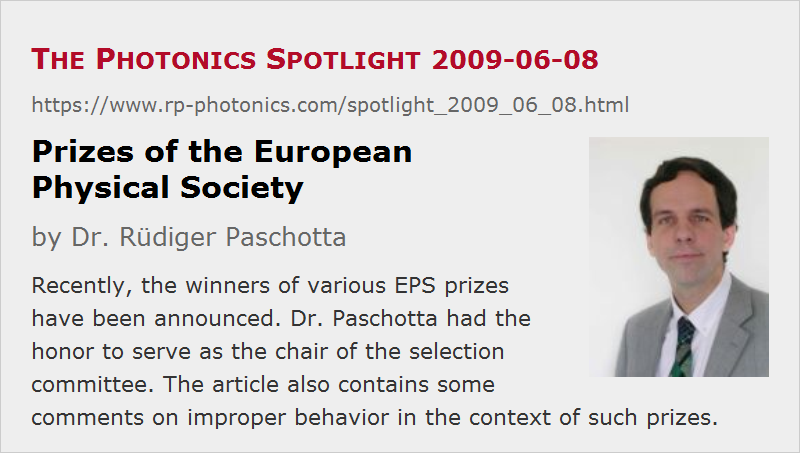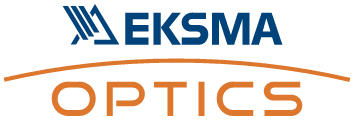Prizes of the European Physical Society
Posted on 2009-06-08 as a part of the Photonics Spotlight (available as e-mail newsletter!)
Permanent link: https://www.rp-photonics.com/spotlight_2009_06_08.html
Author: Dr. Rüdiger Paschotta, RP Photonics Consulting GmbH
Abstract: Recently, the winners of various EPS prizes have been announced. Dr. Paschotta had the honor to serve as the chair of the selection committee. The article also contains some comments on improper behavior in the context of such prizes.
Ref.: announcement of the EPS

The European Physical Society has announced the following research prizes:
- Tobias Kippenberg has received the Fresnel Prize (fundamental) for his pioneering work on ultra-high-Q microresonators for optical frequency comb generation and on optomechanical phenomena.
- Romain Quidant has received the Fresnel Prize (applied) for his work on engineering plasmon properties of metallic nanostructures, extending optical concepts and photonic functionalities down to the nanometer scale.
- Fernando G. S. L. Brandao and Alexei Ourjoumtsev obtained the Ph. D. Thesis Prizes (fundamental) for work in quantum optics (quantum information theory, novel quantum states).
- John C. Travers and Deran Maas obtained the Ph. D. Thesis Prizes (applied) for work on supercontinuum generation (Travers) and novel pulsed semiconductor lasers (Maas).
Besides these junior awards, there have been the following senior researcher prizes:
- Alain Aspect received the Senior Prize for Fundamental Aspects of Quantum Electronics and Optics for his numerous contributions to the fields of quantum and atom optics. He is famous e.g. for his 1982 experiment on quantum entanglement.
- Thomas Ebbesen received the Senior Prize for Applied Aspects of Quantum Electronics and Optics for work on novel optical properties of nanostructured metals and in particular for his discovery of how light can be efficiently transmitted through subwavelength holes.
I had the great honor of serving as the chair of the Junior Awards Committee, taking care of the Fresnel Prizes and the Ph. D. Thesis Prizes. I am glad that a very smooth and clean selection process was possible in collaboration with the other committee members (J. Dudley, F. Wagner, R. De La Rue, D. Meschede, K. Moelmer, and V. Zadkov). At this point I would like to remark that Deran Maas, with whom I once interacted at ETH Zürich, won his prize without a score from my side. I am fully convinced that he deserves the prize, but any potential conflict of interest must be properly handled.
Protecting Ethical Standards
It is unfortunately not always easy to avoid that improper behavior of some colleagues influences the decisions for such prizes. Personally, I have witnessed situations where some person was nominated for a prize not because of his achievements, but simply because he was considered an ally who was supposed to act in the favor of the nominator at later occasions. There are even persons who do not hesitate to put some pressure on colleagues to nominate them, or to suggest shady deals. Some seem not even to realize that this is definitely an improper behavior, undermining the whole sense which such prizes can make: giving recognition to those who deserve it for their scientific contributions or for their service to the community. In the interest of the whole scientific community, we should do our best to discourage such behavior and enforce ethical standards. I would have been prepared to raise my voice in the prize committees where I participated, but gladly have not encountered improper conduct at these occasions.
This article is a posting of the Photonics Spotlight, authored by Dr. Rüdiger Paschotta. You may link to this page and cite it, because its location is permanent. See also the RP Photonics Encyclopedia.
Note that you can also receive the articles in the form of a newsletter or with an RSS feed.
Questions and Comments from Users
Here you can submit questions and comments. As far as they get accepted by the author, they will appear above this paragraph together with the author’s answer. The author will decide on acceptance based on certain criteria. Essentially, the issue must be of sufficiently broad interest.
Please do not enter personal data here; we would otherwise delete it soon. (See also our privacy declaration.) If you wish to receive personal feedback or consultancy from the author, please contact him e.g. via e-mail.
By submitting the information, you give your consent to the potential publication of your inputs on our website according to our rules. (If you later retract your consent, we will delete those inputs.) As your inputs are first reviewed by the author, they may be published with some delay.
 |



If you like this page, please share the link with your friends and colleagues, e.g. via social media:
These sharing buttons are implemented in a privacy-friendly way!